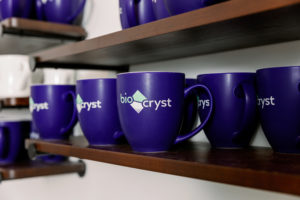Government
Durham drug firm BioCryst receives orphan drug designation for genetic disorder treatment
Durham-based BioCryst, which discovers and develops medicines to treat rare diseases, said the U.S. Food and Drug Administration has granted orphan drug…


RESEARCH TRIANGLE PARK – Durham-based BioCryst, which discovers and develops medicines to treat rare diseases, said the U.S. Food and Drug Administration has granted orphan drug designation for its experimental therapy to treat fibrodysplasia ossificans progressive (FOP).
FOP is an ultra-rare and severely disabling genetic disorder that causes the irregular formation of bone in muscles, tendons, ligaments and other connective tissues. Over time, the condition can cause fused joints, deformities, restricted mobility and premature death.
The FDA’s orphan drug status promotes the development of drugs or biologics that treat diseases or medical conditions that affect fewer than 200,000 people in the United States. Companies that receive the designation are eligible for incentives that can include tax credits for clinical trials, exemption from user fees, and up to seven years of market exclusivity upon product approval.
BioCryst’s new FOP medicine, BCX9250, already had received fast track designation from the FDA earlier this year, as well as both orphan drug status and PRIME designation from the European Medicines Agency (EMA). The FDA’s fast track program and the EMA’s PRIME system are both designed to speed up the process of developing drugs that treat serious conditions and fill unmet medical needs.
“We appreciate the FDA’s decision to grant orphan drug designation to BCX9250 as we work toward our goal of bringing this important oral investigational therapy to FOP patients,” said Helen Thackray, M.D., BioCryst’s chief research and development officer. “The benefits available to us through this designation – and the designations we previously received from the FDA and EMA – have the potential to advance our ALK-2 inhibitor program as efficiently as possible as we move towards beginning trials in FOP patients next year.”
BCX9250 is a novel, oral activin receptor-like kinase-2 (ALK-2) inhibitor designed to constrain the ALK-2 enzyme, which is part of the normal pathway for bone formation. An activating mutation in ALK-2 is necessary for FOP to occur, which makes the ALK-2 enzyme an ideal target for an effective treatment, according to BioCryst.
The company said its Phase 1 clinical trials have shown BCX9250 to be safe and well tolerated by patients.
BioCryst, which trades on the Nasdaq stock exchange under the symbol BCRX, was founded in 1986 and moved its headquarters to Durham in 2010. It focuses on small-molecule medicines in which enzymes play a key role in the biological pathway.
BioCryst’s oral medication ORLADEYO and its intravenous infusion RAPIVAB are approved in the U.S. and multiple global markets. ORLADEYO is a therapy for hereditary angioedema (HAE), a disorder affecting the blood vessels that causes recurring swelling of the limbs, face, intestinal tract and airway. RAPIVAB is used to treat the flu.
(C) NC Biotech Center
The post Durham drug firm BioCryst receives orphan drug designation for genetic disorder treatment first appeared on WRAL TechWire.
biologics
medical
biotech
fda
research
clinical trials
markets
nasdaq

Here Are the Champions! Our Top Performing Stories in 2023
It has been quite a year – not just for the psychedelic industry, but also for humanity as a whole. Volatile might not be the most elegant word for it,…
AI can already diagnose depression better than a doctor and tell you which treatment is best
Artificial intelligence (AI) shows great promise in revolutionizing the diagnosis and treatment of depression, offering more accurate diagnoses and predicting…
Scientists use organoid model to identify potential new pancreatic cancer treatment
A drug screening system that models cancers using lab-grown tissues called organoids has helped uncover a promising target for future pancreatic cancer…













